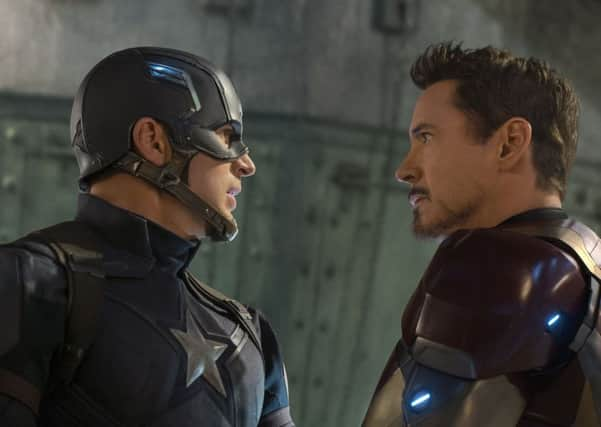Captain America: Civil War - how Marvel's superheroes became a film phenomena


In the annals of blockbuster press conferences, it’s a biggie: a baker’s dozen of high-profile actors and filmmakers seated on two levels in chairs that resemble Roman thrones.
Thus they look down on the assembled gathering. Rabbits and headlights come to mind, a notion clearly accepted by Robert Downey Jr who answers a question and quips, “I’m not really ‘here’. There’s a lot of people here. Can you all turn around for a half hour until I’m back in my body…?”
Advertisement
Hide AdAdvertisement
Hide AdThe abundance of talent on stage at London’s Corinthia Hotel – directors Anthony and Joe Russo, producer Kevin Feige plus actors Anthony Mackie, Chris Evans, Paul Bettany, Paul Rudd, Emily VanCamp, Sebastian Stan, Elizabeth Olsen, Jeremy Renner, Daniel Brühl and Downey – represents the growing ensemble of the Marvel superhero films.
And if they’re jet-lagged, overwhelmed and a little mesmerised by the scope of the film’s European press conference, it’s to be forgiven. Downey and co frequently fall back on banter and giggles as a default. Clearly they’ve had – and are having – a blast on the movies. Good work if you can get it. And a tremendous payday for all concerned.
It falls to Feige to cut through the cast repartee and talk about the impact of the movie, the ones that preceded it and the ones – potentially many of them – to follow. The movie of Captain America: Civil War was mooted more than a decade ago, at the time of the comic book that spawned it. “It was before the Marvel Cinematic Universe even existed,” he explains. “We were just beginning to dream about maybe becoming our studio and getting financing. It was an amazing comic series. I remember reading it every month when it came out and thinking it would probably be impossible [but] wouldn’t it be cool someday to do this? And it wasn’t until about two and a half years ago that we thought, ‘now’s the time. We’ve assembled enough players that we could do it now’.”
Indeed he has. A veritable army, in fact. For Chris Evans, now into his fifth outing as Captain America, part of the thrill of leading the film came from his on-going collaboration with Robert Downey Jr, the former bad boy whose career and reputation has been resurrected by playing Tony Stark aka Iron Man.
Advertisement
Hide AdAdvertisement
Hide AdEvans recognises the value of having Downey on board what was, in essence, somebody else’s movie. He was relieved when he signed up.
“A lot of it rested on Downey’s shoulders – whether or not he’d be willing to do this. And you know right away that when you bring Downey into the equation a movie is going to have a certain level of awareness and charisma.”
The enormity of the Marvel Cinematic Universe, or MCU, means Evans, Downey and the wider ensemble could be gainfully employed for many years to come. And with the MCU clearly outshining rivals DC – last month’s release of Batman v Superman: Dawn of Justice was accompanied by a cacophony of jeers from Press and public alike – means the future looks good.
Evans tries to play down any perceived rivalry. “I don’t think anyone up here makes movies based on what other people are doing. For the most part we’re doing what we do… I shouldn’t say ‘we’. It really is the Marvel higher-ups who’ve somehow figured out this formula of good movies.”
Advertisement
Hide AdAdvertisement
Hide AdBut Downey pays tribute to the screenwriting talents of Christopher Markus and Stephen McFeely in a typically eccentric take on the development of the series.
“Feige and I were out to dinner last night. We were looking back at the last ten years and all the little miracles and blood, sweat and tears that had to happen to keep developing all these characters.
“We just got – not in a self-aggrandising way – giddy and super, super grateful at how things have gotten. I want to say – because I generally give no credit to writers and I’ll try not to do this again – that Markus and McFeely did an exceptional job on this, which was a really tall order.”
Questions have been asked and answers given. But it’s only a matter of time before camaraderie and silliness overwhelm the proceedings. The trigger is an innocuous question from a German journalist directed to German actor Daniel Brühl, playing the villainous Zemo: who had the biggest trailer?
Advertisement
Hide AdAdvertisement
Hide AdSays Brühl: “It wasn’t mine! I didn’t get one.” Adds Feige: “You got a chair!” Elizabeth Olson chips in. “I think it was Mackie.” “That would be correct,” responds a smiling Mackie. “I have a lot of stuff. It’s really nice.” Pointing to Downey: “He has, like, five of ‘em!”
Paul Bettany comments drily: “Robert actually has the smallest trailer. He just has another four trailers.” Downey joins in: “Actually the state of Georgia wanted to give it its own zip code.”
Brühl continues: “When we had lunch I was eating my burrito in my humble little trailer and someone – he was sitting in a golf cart – knocked at my door and said, ‘You are cordially invited to Robert Downey’s village.’ And then in the far distance I saw this huge space with four trailers. Everybody would wonder who was going to get invited.”
This, then, is the unseen world of the Marvel Cinematic Universe. A world of indulgence, jokey excess and blokey one-upmanship. It’s an exclusive club but one that will inevitably grow.
But it indicates the closeness of the cast and points to a formula that is working. The first ten years is up. The next is just beginning…
Captain America: Civil War (12A) is on saturation release.